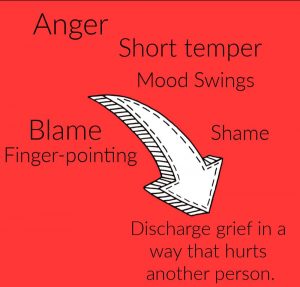Grief Support
We are here for anyone who needs to talk.
Common Feelings Associated with Grief
The tragic loss of a young life in our community impacts all of us. As members of this community, we are each experiencing grief, and we must recognize that it shows up in many different ways for ourselves and our children. Sometimes, we may not realize that these are common feelings associated with grief:
-
- Anger, Resentment and Blame
- Anxiety, Fear, Helplessness
- Confusion
- Despair, Sadness, Loneliness, Feeling empty
- Disappointment
- Exhaustion
- Guilt, Regret, Shame
- Hopelessness
- Shock and disbelief, Feeling numb, Denial
What do we do with these feelings?
Whether acknowledged or not, the grief will find its way out. Motivated by many of these feelings, we behave in certain ways. We think, say or do things that have a ripple effect on other people (in our home, in our circle of friends, and even in our private groups on social media).
These two are very common on Facebook now:


What can we do instead?
If we are able to slow down, we can observe how grief is showing up for each of us and how it is impacting what we think, say or do these days.
- Have compassion for yourself. Acknowledge the feelings.
- Talk to someone about your grief. This may be a friend or family member, or it may be a local counselor.
- Practice mindfulness. Remind yourself throughout the day to pause your racing thoughts and pay attention to the present moment instead.
- Choose a simple, loving response. Check in with a friend to ask how they are doing. Shower your children with acts of kindness. If you post anything on Facebook, let it be encouragement for all who will see it.
- Share this lesson with your children. Our local teens are especially vulnerable right now. Please talk to them about the many faces of grief. Encourage daily screen-free time to process their feelings in person with their loved ones. Eat together. Walk, hike or exercise together. Remain available.
Do not be afraid to talk to your tween/teen about suicide and loss.
We know that this topic is on everyone’s minds right now and it is okay to talk about.
- Ask your child how they are doing.
- Gently invite dialogue about what they are thinking about, seeing online or talking about with their friends.
- Simply listen and validate their feelings.
- Remind them that you are always available.
If you are concerned about their safety, please familiarize yourself with these resources:
- Go to Know the signs–because emotional pain isn’t always obvious.
- Share this chat link with someone who may need to talk.
- Keep these numbers handy:
- Lifeline 1-800-273-8255
- Local Mobile Crisis 2-1-1
Visit the American Foundation for Suicide Prevention for additional information about talking to your kids.
